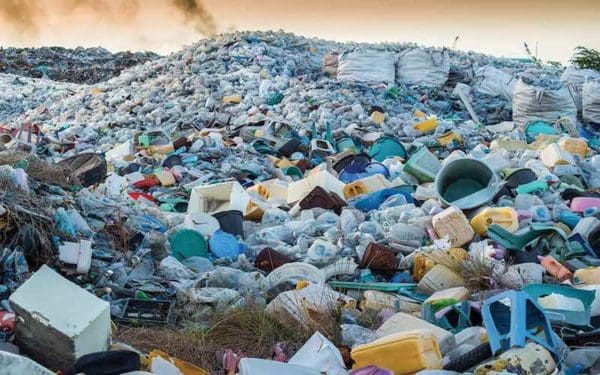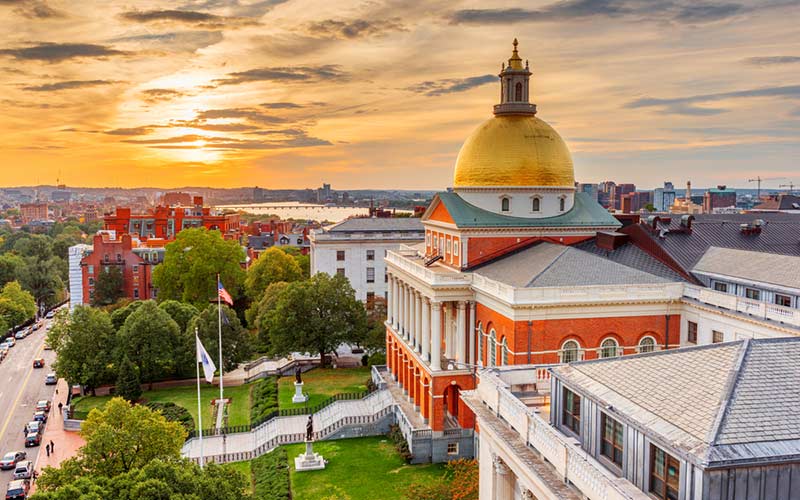
Massachusetts leads the way with a bold climate bill for a healthier future. Photo: Shutterstock.
Massachusetts has taken a historic step towards a cleaner, healthier future for all its residents. With the Governor’s signature, the state’s climate bill is now law – a bold move to address climate challenges while making everyday life better for families, commuters, business owners, and communities. Here’s a closer look at how this groundbreaking bill will impact your life, no matter who you are or where you live.
Healthier Neighborhoods for Families and Neighbors
We all want to live in safe, clean neighborhoods where our families can thrive. But pollution from dirty fossil fuels continues to harm our air. Adopting clean energy sources can help us create the healthy communities we deserve – and our friends and family want to be part of that solution, too. But for years, outdated restrictions have blocked many homeowners from installing solar panels or upgrading to other clean energy technologies.
This bill will allow Massachusetts to develop cleaner energy under a faster timeline while also engaging with community members. This will give homeowners cleaner energy options, leading to cleaner air and lower energy bills. It even promotes community initiatives like adding solar panels over parking lots, so everyone benefits from clean energy, whether they own a home or not.
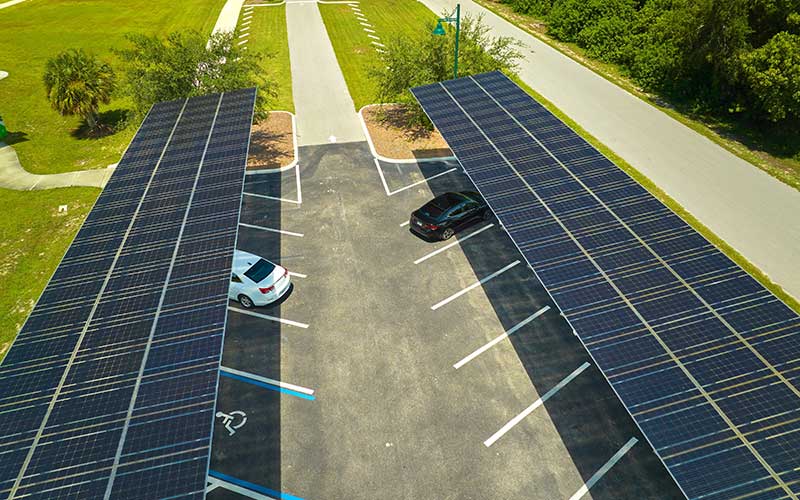
Protecting Communities in Energy Projects
Urban residents often face environmental risks, like pollution from nearby industries. This law aims to protect these communities – especially those most affected by pollution – through some key measures.
For starters, the climate bill creates a guide – called a site suitability framework – for deciding what locations should top the list when choosing sites for new energy infrastructure, such as electric substations. Developers and state regulators will look to old industrial sites or covered landfills first – instead of residential areas. This will help create more clean energy projects without adding extra environmental burdens to our neighborhoods.
The law also requires developers and regulators to consider cumulative impacts. That means developers must evaluate how a project could add to existing environmental burdens when submitting an application to build one of these facilities.
Take, for instance, industrialized neighborhoods in Lawrence or New Bedford, where Black and Brown families already endure higher pollution levels than the rest of the state. Under this law, any new development must account for current environmental and health burdens before moving forward. This will give residents a better chance to protect their families and advocate for a cleaner, safer, and healthier environment.

Giving Communities a Voice in Energy Projects
For neighborhoods and communities, this bill brings something crucial: a real say in local energy projects. Now, developers will have to reach out and hold public meetings before submitting an application to build a facility, giving residents a chance to voice their concerns or support from the beginning. This would help speed up the process by preventing delays that – had the public received a fair chance to provide input – could have been addressed earlier.
The bill also steps up support for neighborhoods that have been hardest hit by environmental issues, like those near industrial areas. The Office of Environmental Justice and Equity will help communities participate in the processes shaping their community. To ensure everyone can access this support, an “Intervenor Trust Fund” covers legal and expert costs so communities have the resources to speak up to protect their health and environment.
Clean and Convenient Transportation for Those on the Move
Commuters Wanting a Cleaner Ride
Who wouldn’t love to have the option of traveling without worrying about polluted air or fluctuating fuel prices? Well, many Massachusetts drivers have been eager to switch to electric vehicles, but a lack of charging stations, especially in low-income areas, has held us back. And for many – especially our neighbors living in rural areas – accessible public transit is not yet an option, so they must rely on a car to get where they need to go.
This bill addresses that directly by expanding infrastructure needed for electric cars, vans, and other vehicles across the state. It focuses on making it easier for everyone to take advantage of these vehicles, including residents of multi-family buildings. This means more people will have the option to upgrade to cleaner transportation, cutting down on both air pollution and fuel costs.
Communities Living Near Airports
Communities near airports – such as our East Boston neighbors next to Logan International Airport – will also benefit. Residents here frequently endure noise, traffic, and air quality issues associated with airport operations. Under this new climate law, Massport must consider communities’ health and quality of life in future expansions. The hope is to ensure that increased options for air travel will not come at the cost of our neighbors’ well-being.
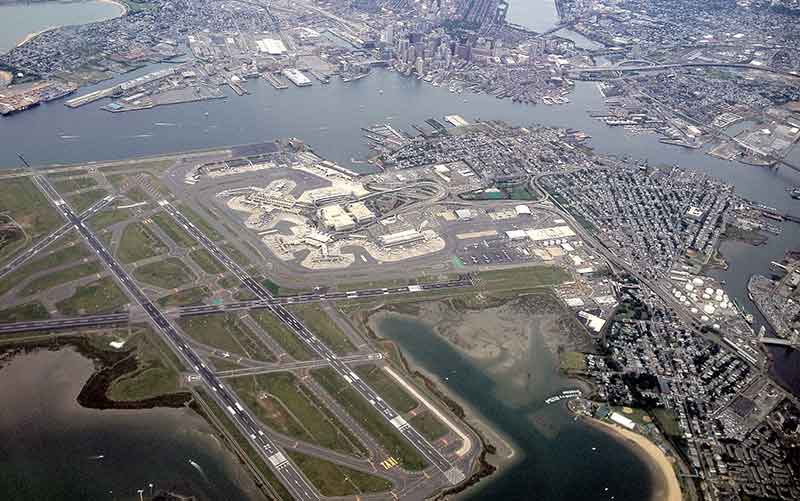
A Bright Future for Workers, Businesses, and Communities
Our state, home to so many innovators, is ready to lead the shift to a cleaner economy. But, for too long, fossil fuel companies have profited by keeping us dependent on outdated and toxic energy sources at the expense of our health, environment, and economic potential.
The climate bill aims to cut through those barriers, allowing energy businesses to transition to solutions that reduce pollution and improve public health. By encouraging the shift to clean energy, the bill fosters economic growth while prioritizing the health and well-being of our communities. And, with fewer bureaucratic delays, businesses in clean energy sectors – like solar farms in western Massachusetts or wind energy off of Cape Cod – can move forward faster, too.
We also believe no worker should be left behind in the transition to clean energy. This bill values the livelihoods of those currently employed in fossil fuel industries. It will provide resources and conduct studies to ensure these workers have pathways to secure jobs in the clean energy sector. This isn’t just about policy—it’s about every Massachusetts worker having a place in our greener future.
For developers ready to build the clean infrastructure of tomorrow, the bill tackles bureaucratic hurdles that have slowed down progress. This bill will simplify permitting processes for clean energy projects. This means solar farms, offshore wind, and other clean energy initiatives can be implemented faster and help make our future clean energy system robust, reliable, and affordable for everyone in the Commonwealth.
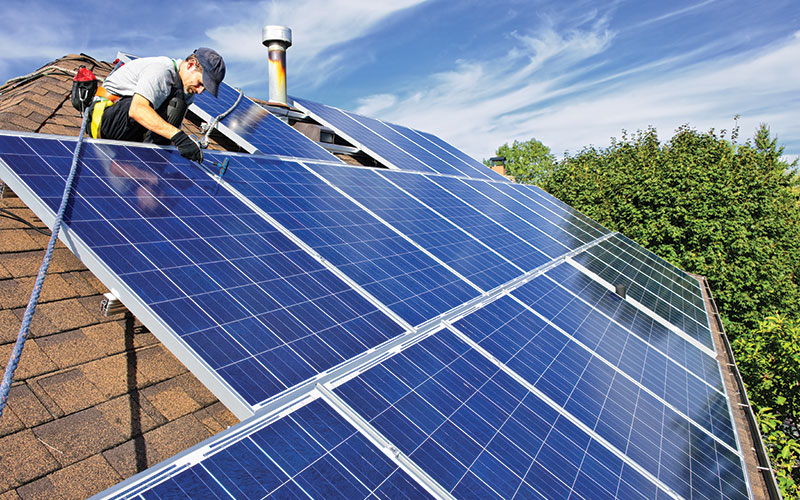
Building a Healthier Tomorrow for All
This climate bill isn’t just a piece of legislation – it’s a vision for a more sustainable and equitable Massachusetts. It centers communities, provides a pathway to cleaner energy, and paves the way for cleaner, safer transportation. Addressing the unique needs of different communities – from renters to industrialized neighborhoods – can help guarantee everyone benefits from this bold initiative to tackle the pollution overheating our planet.
Together, we can continue to support a cleaner, healthier, and more resilient Massachusetts. For now, let’s celebrate! Thank your elected officials for passing this critical piece of legislation. Tell them you want them to continue to invest in policies that protect our communities, make renewable energy accessible, and build a future where everyone can thrive.

